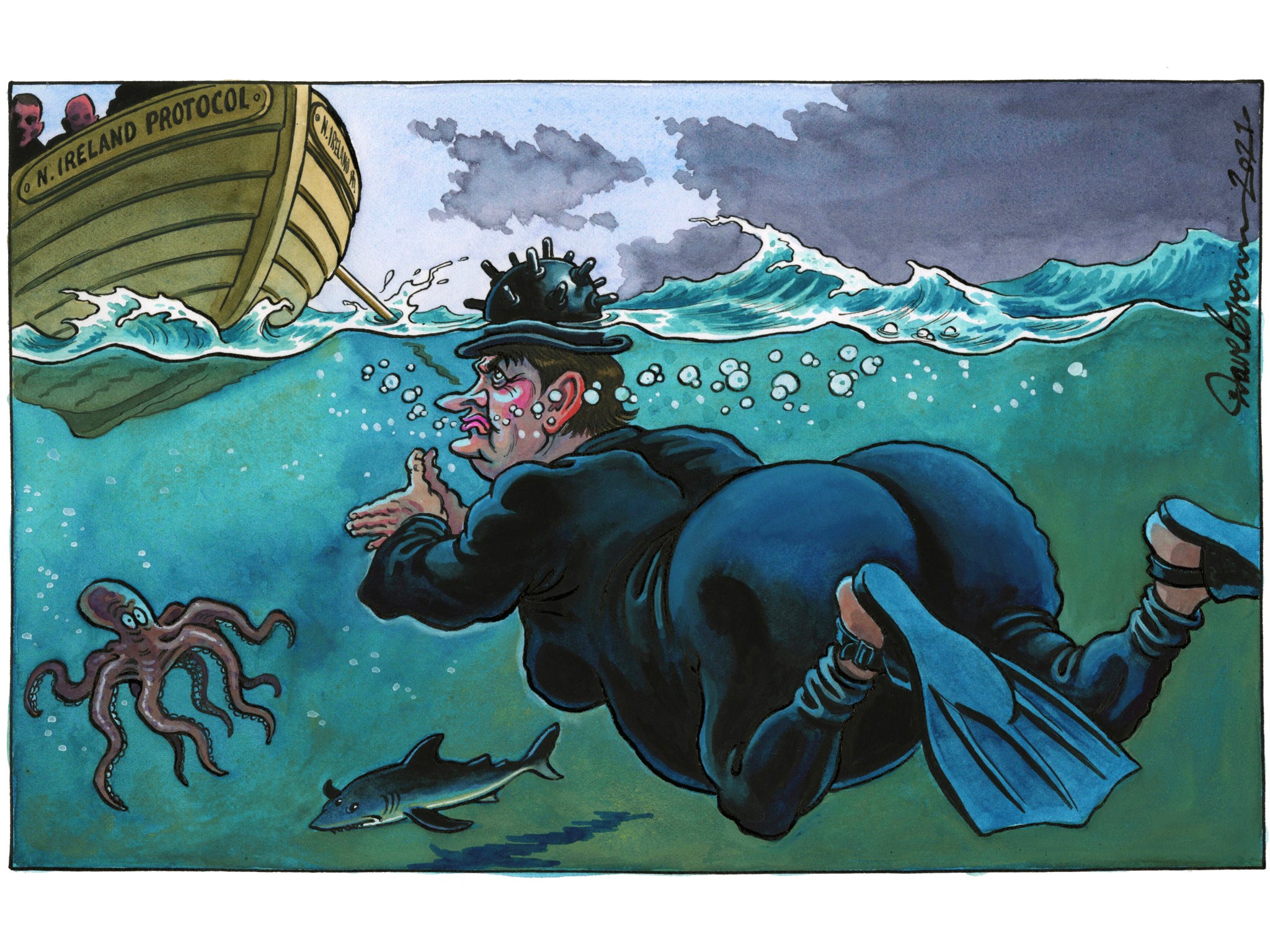If we lose the Northern Ireland protocol, the rest of Brexit could quickly unravel
Editorial: Placing Northern Ireland simultaneously inside two customs and single market regimes was always going to be complicated – but there is no obvious alternative

For those hoping that the end of the transition period would mean never hearing about Brexit again, the last few weeks will have been something of a disappointment. Concealed somewhat by Covid restrictions and the general global economic downturn, Brexit has already started to have some dramatic and malign effects across the UK. At the more trivial level there are the price hikes for French wines; more serious is the permanent and complete collapse of the Scottish shellfish industry, and the acute economic pain and political distress in Northern Ireland.
There are many who blame the Northern Ireland protocol for the current crisis in relations between the EU and the UK. There is something in that, because Brussels and London have both tried to weaponise it in recent weeks. Indeed even before it came properly into operation, the British government’s Internal Market Bill proposed to override the protocol at the unilateral and complete discretion of HM Government. This was the first breach of trust, and was in due course withdrawn.
Following that came the EU’s clumsy invocation of Article 16 of the protocol during the “vaccines war”. That too shook confidence in the new arrangements and destroyed trust among all concerned.
The subsequent exchanges between the various sides have hovered between terseness and aggression. Unionist politicians demand the protocol be scrapped, loyalist paramilitaries appear to be starting a campaign of intimidation, and Michael Gove uses this instability to attempt to renegotiate the protocol, or at least postpone its implementation for two years. It is not, of course, admitted to be an extension of the transition period, but as a period of “grace”.
Even if Mr Gove’s suggestion was to be taken up, the problems of policing the economic border on the Irish Sea would still exist. The UK would not rejoin the EU single market or customs union. The integrity of the single market would still be in jeopardy, and the EU and Northern Irish officials would still be threatened with their lives. The grace period does not provide an answer to the latest iteration of the historic “Irish Question”; it merely asks everyone to stop asking it.
The facts on the ground are shifting in Northern Ireland, and in an unpredictable and sinister fashion. Just as the economic and political question is whether the UK’s border with the EU should be on the island of Ireland or across the Irish Sea, so now the choice arises as to whether any outbreak of violence occurs around the ports of Northern Ireland or in the roads and lanes linking Northern Ireland and Ireland. If the British government unilaterally renounced the protocol, de jure or de facto, it would force the EU and Ireland to construct a land border, and to take retaliatory action against the UK. No one can be sure where such escalations could lead.
Legally and politically there is really no alternative to the protocol. In itself it forms part of an international treaty signed only weeks ago. If it goes, much of the rest of the Brexit deal could unravel, with wide-reaching consequences. The protocol is also the only realistic way to reconcile Brexit and the Good Friday Agreement, and thus peace in the British Isles (in the geographic sense of the term – terrorist activity can quickly spread).
Apparently prosaic questions about moving seed potatoes or used cars or Tesco lorries from Britain to Northern Ireland ought to be easy to sort out, but in reality they are not amenable to rapid economic resolution because they often defy logic. Having a veterinary or other certificate for every batch of mince is prohibitively expensive, and is a barrier to the “unfettered trade” the prime minister promised.
Placing Northern Ireland simultaneously inside two customs and single market regimes was always going to be complicated and messy. This economic version of Schrödinger’s cat was always going to perplex those tangled up in its logical contradictions and unreliable software. The EU-UK Joint Committee and its working groups were established to grind through these often irreconcilable demands precisely because both sides implicitly conceded that the protocol was an exercise in “cakeism”.
It is increasingly clear how unworkable it has become, but there is no obvious alternative to the protocol. In the meantime, even more “grace” arrangements are due to end, and after that comes a four- or eight-yearly cycle of renewal of democratic consent in Northern Ireland and various formal reviews of Brexit as a whole between the UK and EU. The Labour Party might even, at the next election, pledge to tweak the Brexit deal for a closer relationship. We have not, then, heard the last of Brexit. Far from it.
Join our commenting forum
Join thought-provoking conversations, follow other Independent readers and see their replies
10Comments